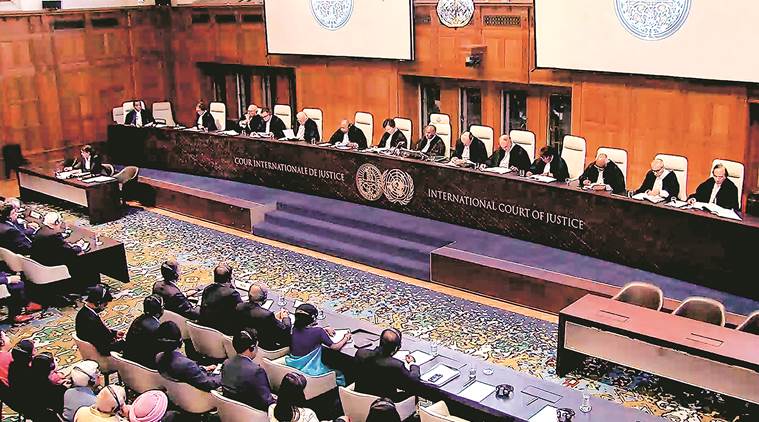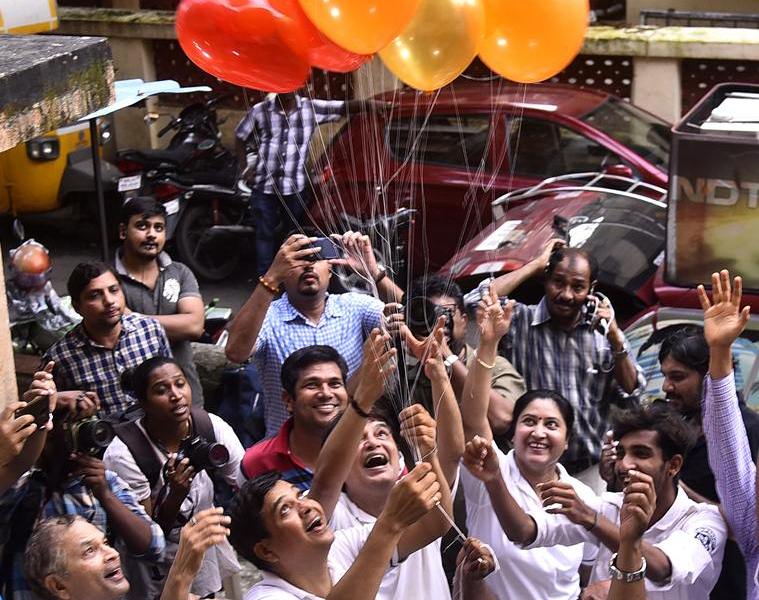
After more than two years of battle at the global court, New Delhi won a legal and diplomatic victory over Islamabad Wednesday after the International Court of Justice ruled that Pakistan must review the death sentence for Indian national Kulbhushan Jadhav. He was sentenced by a Pakistani military court on charges of “espionage and terrorism”.
The court affirmed the former Indian Navy officer’s right to consular access and slammed Pakistan for denying this. And made it clear that Jadhav’s death sentence should remain suspended until Pakistan effectively reviews and reconsiders the conviction and sentence in the light of its breach of Article 36 — that is denial of consular access and notification.
The court, however, rejected India’s call to annul the military court decision and ensure his release and safe passage home. This means that Jadhav will not be free in the immediate term and the ball is in Pakistan’s court to decide his fate.
In reality, this judgment underlines that Jadhav must get access to consular and legal assistance but does not rule that he can be tried under the civilian court of law.
Full text: Kulbhushan Jadhav ICJ verdict
The only thing, it says, is that the review and reconsideration should be “effective”. It has even suggested to Pakistan’s government that it can take legislative action to make the process of review and reconsideration “effective” — this is right now in the military court’s domain.
The judgment comes in the wake of strained ties between India and Pakistan over the last few years as Delhi isolates Islamabad on the global stage. Much will depend on how Islamabad acts on this judgment.
Read | What next for Pakistan
Ball in its court, pressure on Pak
Granting consular access and legal help to Kulbhushan Jadhav is low-hanging fruit which Delhi can pluck from the verdict. The court steered clear of adjudicating on charges against Jadhav and didn’t set him free. It has called for a review but has left it to Pak to decide how. It’s upon Pak to show if it follows a process that’s fair — and seen to be fair in tune with the verdict.
The 42-page verdict, read out by Judge Abdulqawi Ahmed Yusuf, President of the Court, at the Peace Palace at The Hague on Wednesday was decided with 15 judges, including China’s judge, in favour while only Pakistan’s ad-hoc judge Justice Tassaduq Hussain Jillani was the lone dissenter.
Read | After Masood Azhar blacklisting, ICJ verdict in Kulbhushan case isolates Pakistan
India’s delegation was led by Joint Secretary (Pakistan-Afghanistan-Iran) in the Ministry of External Affairs, Deepak Mittal, and his team of officials and lawyers.
The court ruled that it “finds that the Islamic Republic of Pakistan is under an obligation to inform Mr. Kulbhushan Sudhir Jadhav without further delay of his rights and to provide Indian consular officers access to him in accordance with Article 36 of the Vienna Convention on Consular Relations”.

It said that the court finds that the “appropriate reparation in this case consists in the obligation of the Islamic Republic of Pakistan to provide, by the means of its own choosing, effective review and reconsideration of the conviction and sentence of Jadhav so as to ensure that full weight is given to the effect of the violation of the rights set forth in Article 36 of the Convention..”
It added that a “continued stay of execution constitutes an indispensable condition for the effective review and reconsideration of the conviction and sentence” of Jadhav.
Must Read | Sushma to Salve, diplomats to lawyers wrote script
The court also found that, “by not informing Jadhav without delay of his rights under Article 36, paragraph 1(b), of the Vienna Convention on Consular Relations”, Pakistan “breached the obligations” incumbent upon it under that provision. It also said that by “not notifying the appropriate consular post of the Republic of India in the Islamic Republic of Pakistan without delay of the detention of Mr Kulbhushan Sudhir Jadhav and thereby depriving the Republic of India of the right to render the assistance provided for by the Vienna Convention to the individual concerned, the Islamic Republic of Pakistan breached the obligations incumbent upon it under Article 36, paragraph 1 (b), of the Vienna Convention on Consular Relations.”
Read | Kulbhushan Jadhav case: Key points
It said that Pakistan deprived India of “the right to communicate with and have access to Jadhav, to visit him in detention and to arrange for his legal representation, and thereby breached the obligations incumbent upon it under Article 36, paragraph 1 (a) and (c), of the Vienna Convention on Consular Relations”.
While all these clauses were ruled 15-1, there was unanimity on the jurisdiction issue. It said that the court “unanimously, finds that it has jurisdiction, on the basis of Article I of the Optional Protocol concerning the Compulsory Settlement of Disputes to the Vienna Convention on Consular Relations of 24 April 1963, to entertain the Application filed by the Republic of India on 8 May 2017”.
Welcoming the ICJ verdict, Prime Minister Narendra Modi said that “truth and justice have prevailed”. “Congratulations to the ICJ for a verdict based on extensive study of facts. I am sure Kulbhushan Jadhav will get justice,” he tweeted.
READ | Kulbhushan Jadhav verdict — a look at India’s arguments and Pakistan’s defence
External Affairs Minister S Jaishankar said that he spoke to Jadhav’s family. “Applaud their courage. Satyameva Jayate,” he tweeted.
While India’s Ministry of External Affairs called it a “landmark judgment” and said that “we expect Pakistan to implement the directive immediately,” Pakistan’s Foreign Ministry said that “as a responsible member of the international community, (it) upheld its commitment from the very beginning of the case by appearing before the honourable court for the provisional measures hearing despite a very short notice. Having heard the judgment, Pakistan will now proceed as per law.”
However, Islamabad maintained that Jadhav entered Pakistan without a visa on an authentic Indian passport with a fake alias Hussain Mubarak Patel, and alleged “Commander Kulbhushan Jadhav is responsible for acts of sabotage, espionage and multiple terrorist incidents…this is a clear case of Indian state terrorism.”
Read | Govt, Oppn hail ruling; PM Modi says truth prevailed
Jadhav, a retired Navy officer, was arrested allegedly on March 3, 2016, and India was informed of this on March 25, 2016, when the Pakistan Foreign Secretary raised the matter with the Indian High Commissioner in Islamabad. On that day, India sought consular access to Jadhav at the earliest. New Delhi then moved the ICJ in May in 2017 against the “farcical trial” by the military court of Pakistan against 48-year-old Jadhav. He was sentenced to death on charges of espionage and terrorism in April 2017.

India had first approached the ICJ on May 8, 2017, for the “violation” of the provisions of the Vienna Convention on Consular Relations, 1963 by Pakistan by repeatedly denying it consular access to Jadhav.
On May 9, 2017, the ICJ asked the two countries to present their arguments and till such time, asked Pakistan from not doing anything. On May 15, the two sides presented their arguments at a public hearing and, on May 18, the 10-member-bench of the international court restrained Pakistan from executing Jadhav — until a final verdict.
After written submissions by both sides mid 2018, the court fixed oral arguments to be made by representatives from both countries from February 18 to 21, 2019.
These hearings took place in the backdrop of the Pulwama terrorist attack on February 14, 2019, which was the single bloodiest terrorist attack in Jammu and Kashmir in the last three decades of militancy.
While India argued on February 18 and 20, Pakistan responded on February 19 and 21. India was represented by former Solicitor General Harish Salve and Joint Secretary Mittal. Pakistan was represented by Anwar Mansoor Khan, Attorney General for Pakistan, and the legal counsel was Khawar Qureshi.
Read | Who is Harish Salve?
Interestingly, since there was a former Supreme Court of India’s judge Justice Dalveer Bhandari on the 10-member bench of the ICJ, Pakistan was given an opportunity to have an ad-hoc judge on the bench, Justice Tassaduq Hussain Jillani, a former Chief Justice of Pakistan.
Pakistan claims that its security forces arrested Jadhav from restive Balochistan province on March 3, 2016 after he reportedly entered from Iran. But India maintains that Jadhav was kidnapped from Iran where he had business interests after retiring from the Navy.